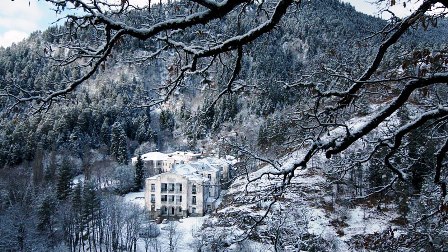


Mariam Chachia & Nik Voigt: Magic Mountain

I was a juror at the DocsBarcelona and contributed to the jury choice of Georgian documentary “Magic Mountain” for the main award in the Panorama section. In beforehand I had written the following key words for the deliberation meeting, having seen the film:
…beautifully crafted cinematography, dares to go for long atmosphere creating sequences, multilayered, people, history of the country, the landscape around…
Cinematography first, excellent work by Voigt through the many years of shooting – the two started filming in 2014. With the camera he is inside and outside the impressive Abastumani, he is there when it is light and when it is dark, catching panoramas of the mountain and the landscapes and making superb observations of the people in the tubercolosis sanatorium. Going close when the director Chachia goes close to meet, talk to and play backgammon with the men, who for many have been there for years.
The film is full of long sequences that serve to create the nightmarish atmosphere that met Chachia, when she was ill and now, when she returns to experience the sadness and melancholy that reign at the magic mountain building, that is taken down as it has been bought by the Georgian oligarch, who by the way is also the one, who transported trees for his personal park in the film of Salomé Jashi! A building in decay, poverty and decadence.
Abastumani is a historical place – a member of the Romanov czarist family is said to have been there and was cured for the disease, a statue of him was built in gratitude – and taken down when the communists came to power and made the hospital a famous health place in the USSR.
Thus the film has many layers but for me the patients and the staff were the main attraction. A conversation with Ismaël that Chachia has, is both full of humor as it takes place – he is planning to go home to meet a woman, he has met on the phone, to have a life with her – and of sadness when later Chachia is informed by other patients that Ismaël passed away after he left Abastumani. Or Manana who can not take her pills even if the doctors try their best, she denies, she can not swallow them. Very touching scenes. Or the unlucky priest or…
It all comes together in a beautiful film, emotional and informational it is and it has found the right tone for its narrative and cinematic interpretation. Wish it a good further festival life.
Georgia/Poland, 2023, 73 minutes.